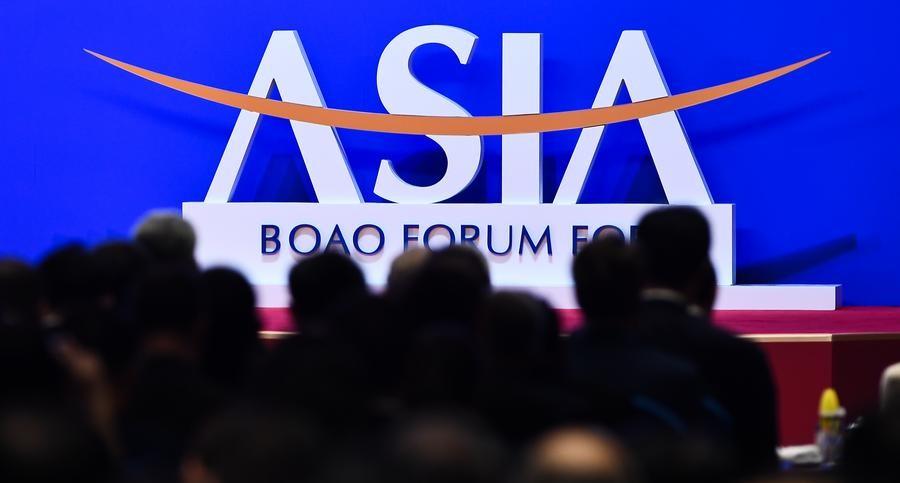
 0 Comment(s)
0 Comment(s) Print
Print E-mail China.org.cn, April 3, 2024
E-mail China.org.cn, April 3, 2024

A logo is seen at the opening ceremony of the Boao Forum for Asia Annual Conference 2024 in Boao, south China's Hainan province, March 28, 2024. [Photo/Xinhua]
Focused on the critical theme of "Asia and the World: Common Challenges, Shared Responsibilities," the recently concluded Boao Forum for Asia (BFA) Annual Conference 2024 cemented consensus on shared multilateral progress. Through in-depth exchanges spanning artificial intelligence, security, Asian financial cooperation and robust supply chain management, about 2,000 delegates from over 60 countries and regions witnessed imperatives for international cooperation within and beyond Asia.
"In the face of serious and complicated global risks and challenges, we must reinforce confidence and work together to build a community with a shared future for mankind and create a better future for Asia and the world at large," said China's top legislator Zhao Leji in his keynote address.
On the global economy front, the forum strengthened the case for closer regional integration and low-carbon development among countries currently undergoing industrialization. China's own example is particularly noteworthy: Efficient and low-carbon development is slated to boost the nation's economic growth by leaps and bounds, while facilitating an investment and consumption market in excess of a $1.3 trillion mark each year.
Partnering with other states can strengthen Asia's economic growth ecosystem, an important consideration to offset challenges of a sluggish global economic recovery, rising trade protectionism and zero-sum decoupling. BFA has long served as a melting pot for joint intervention, adding credit to Asia's profile as a driving force for global growth. This year Asia is expected to contribute over 60% to global GDP growth. Thus, focused interactions and high-level commitments underscored by Asian nations are key to expanding Asia's lead in the sustainable development space.
Interestingly, this year's forum also carried important lessons on maintaining joint security and sovereign independence in Asia, while deepening engagement in promising sectors. In Zhao's speech, peace and stability "are the common aspirations of Asian people" and China continues to propose pathways for Asia's regional order, being aware of all parties' and generations' interests. Consider Beijing's status as a top trading partner for more than 140 countries and territories, and its commitment to dialing-up win-win cooperation with Asian states to propel new sources of growth.
Such development endeavors remain paramount when cold war mentality and other growth impediments are set aside. A truly sustainable future for Asia demands an all-inclusive, secure and future-oriented development strategy that puts the common voice at the center of a common vision. Thus, a central ingredient to this aspiration is a non-discriminatory, mutually-upheld trade and cooperation environment, emphasizing BFA's common ground.
The 2024 BFA Annual Conference also made vital strides towards tapping diverse perspectives from across Asia, including viewpoints on supply chain management, digital economy and new energy. Involved parties stand to gain from a host of trade and connectivity imperatives, including the "Digital Silk Road" and the Regional Comprehensive Economic Partnership (RCEP). The benefit of a highly interconnected region, green development, sustainable infrastructure and industrial innovation are indeed high-value frontiers which were subject to due priority at the conference. "For Asia, our common responsibility is to maintain regional peace and security, uphold our role as a dynamic engine of global economic growth and continue to promote deeper integration and better connectivity," remarked BFA Secretary-General Li Baodong.
All things considered, the BFA Annual Conference 2024 delivers on the organization's deep-seated commitment to stronger regional economic integration, particularly in the face of seismic global shifts and common challenges.
The author is a foreign affairs commentator, author and recipient of the Fulbright Award.
Opinion articles reflect the views of their authors, not necessarily those of China.org.cn.
Go to Forum >>0 Comment(s)